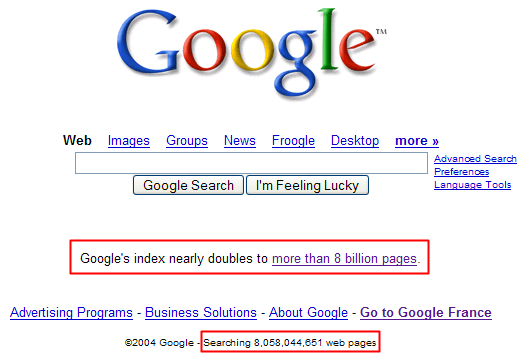By Olivier Duffez, November 11, 2004 at 11:46 AM in: -
Google has just updated the number of pages officially indexed, displayed on its homepage, from 4,285,199,774 to 8,058,044,651 pages. Since a long time many queries lead to more than 4 billions results (this is only an approximation). As Andy Beal , "The update obviously helps explain all of the recent activity by Googlebot and ensures that Google retains the title of the largest index".
As usual, the date of this announcement is chosen precisely by Google. Today is also the launch of MSN Search Beta, one of Google's competitors. Coincidence?

On google.com homepage you can read "Google's index nearly doubles to more than 8 billion pages" with a link to Bill Coughran's on the official Google blog.
Google's index nearly doubles.
You probably never notice the large number that appears in tiny type at the bottom of the Google home page, but I do. It's a measure of how many pages we have in our index and gives an indication of how broadly we search to find the information you're looking for. Today that number nearly doubled to more than 8 billion pages. That made me smile.
Comprehensiveness is not the only important factor in evaluating a search engine, but it's invaluable for queries that only return a few results. For example, now when I search for friends who previously generated only a handful of results, I see double that number. These are not just copies of the same pages, but truly diverse results that give more information. The same is true for obscure topics, where you're now significantly more likely to find relevant and diverse information about the subjects. You may also notice that the result counts for broader queries (with thousands or millions of results) have gone up substantially. However, as with any search engine, these are estimates, and the real benefit lies with the queries that generate fewer results.
The documents in Google's index are in dozens of file types from HTML to PDF, including PowerPoint, Flash, PostScript and JavaScript. Together these pages represent a good chunk of the world's information, but hardly all of it. That's why we keep building more advanced systems for crawling the web and creating more sophisticated indices to sort what we find. So 8 billion pages is a milestone worth noting, but it's not the end of the road. The real test is how well we do in finding what you want from within those pages. We'll keep improving that too.
Bill Coughran V.P., Engineering
Other blog coverage:



Comments
No comment.
Post a comment
Comments for this post are disabled.